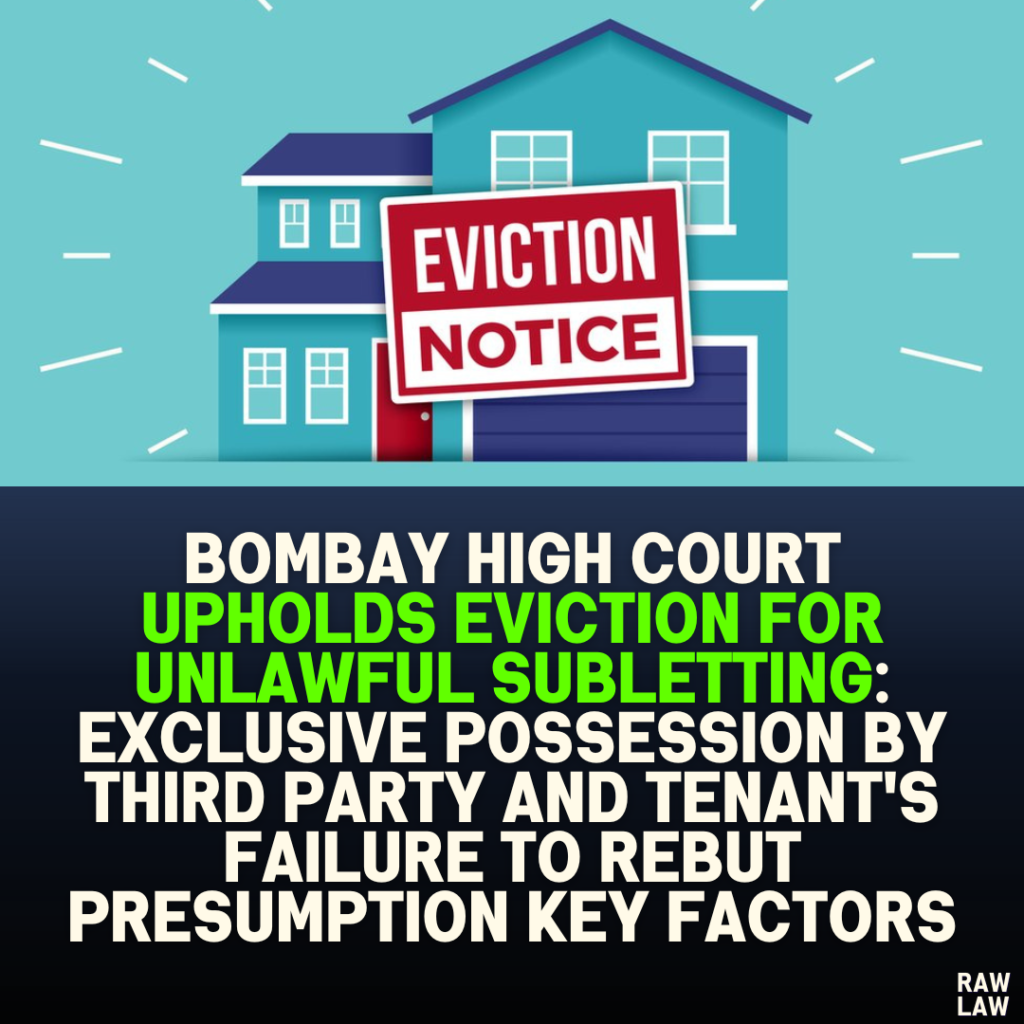Court’s Decision
The Bombay High Court dismissed the Civil Revision Application challenging the Appellate Court’s decree for eviction of the defendant on the grounds of unlawful subletting. The court upheld the findings of the Appellate Court, which inferred unlawful subletting based on the defendant’s inability to substantiate claims of conducting independent business and the proven presence of a third party in the suit premises.
Facts
The dispute concerned premises located on V.P. Road, Mumbai. The plaintiff, owner of the building, alleged that the defendant, who was the tenant, had unlawfully sublet the premises multiple times to different parties, including one Shri Ganesh Dairy and another entity, Woods Fashion, without the landlord’s consent.
Initially, the trial court dismissed the suit, finding insufficient evidence to establish subletting. However, the Appellate Court reversed this decision and decreed eviction based on the defendant’s failure to prove independent occupation or business activity in the premises.
Issues
- Whether the defendant unlawfully sublet the suit premises to a third party.
- Whether the plaintiff met the evidentiary burden to prove subletting.
Petitioner’s Arguments
- The petitioner (defendant) contended that the third party found on the premises was an employee, not a subtenant.
- The petitioner argued that the burden of proving unlawful subletting rested solely on the plaintiff.
- It was claimed that the Appellate Court erred in reversing the trial court’s findings without sufficient evidence.
Respondent’s Arguments
- The respondent (plaintiff) asserted that the defendant failed to provide any credible evidence, such as invoices or business records, to substantiate his claims of independent occupation.
- It was argued that the defendant had sublet the premises clandestinely and changed businesses frequently to mask subletting.
- The respondent highlighted inconsistencies in the petitioner’s testimony and relied on adverse inferences drawn from the lack of documentation.
Analysis of the Law
The court relied on established principles from precedents such as Celina Coelho Pereira v. Ulhas Mahabaleshwar Kholkar and Prem Prakash v. Santosh Kumar Jain & Sons. It reiterated that:
- The initial burden of proving subletting lies on the landlord.
- Once the presence of a third party is established, the burden shifts to the tenant to explain the nature of their presence.
- Subletting can be inferred if exclusive possession by a third party is proven and the tenant fails to rebut this presumption adequately.
Precedent Analysis
- In Celina Coelho Pereira, the Supreme Court clarified that subletting entails parting with possession of the premises for compensation.
- In Prem Prakash, the court emphasized that direct evidence of monetary consideration is not necessary, and inferences can be drawn from circumstantial evidence.
Court’s Reasoning
- The High Court noted that the defendant admitted the presence of a third party but failed to provide credible evidence of their status as an employee.
- The court found the defendant’s claims of conducting business unsubstantiated due to the lack of supporting documentation, such as invoices or tax returns.
- Frequent changes in the type of businesses conducted on the premises and inconsistencies in the defendant’s narrative further weakened the petitioner’s case.
Conclusion
The court dismissed the Civil Revision Application, affirming the Appellate Court’s decree of eviction. It held that the defendant had unlawfully sublet the premises and failed to prove otherwise. The defendant was granted time until February 28, 2025, to vacate the premises, subject to conditions.




Pingback: Bombay High Court Quashes Rejection of Delay Condonation in Filing Form 9A, Cites Procedural Delay Due to Shift to Electronic Filing Under Section 119(2)(b) of Income Tax Act - Raw Law
Pingback: Supreme Court Restores Partition Decree: Affirms Civil Court Jurisdiction Over Title Disputes Despite Revenue Authority's Rejection Under Assam Land Revenue Regulation, 1886 - Raw Law
Pingback: Supreme Court Modifies Visitation Rights to Prioritize Welfare of Two-Year-Old Child: Reduces Travel Burden by Shifting Visitation Venue to Madurai, Ensures Supervised Access for Father - Raw Law